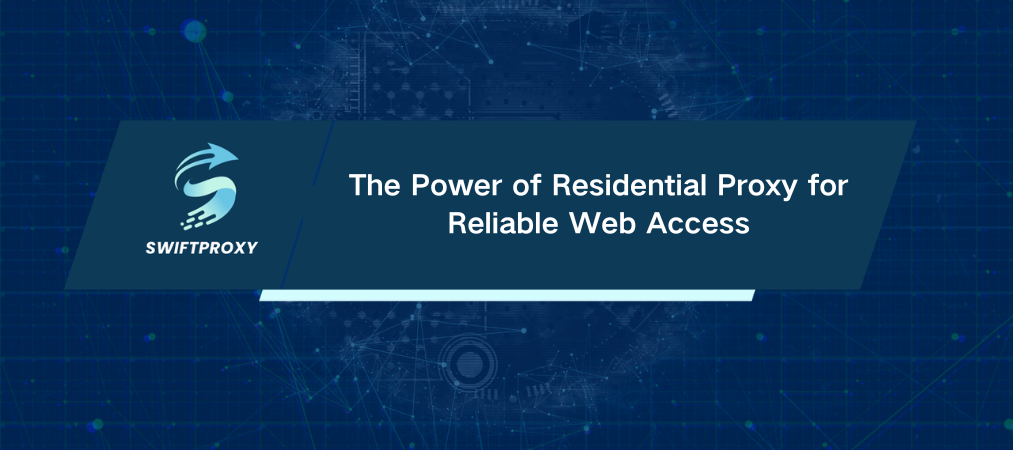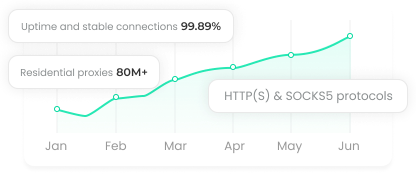The Power of Residential Proxy for Reliable Web Access

Imagine accessing the internet through a real home — an IP address tied to an actual person's house. Sounds powerful, right? That's exactly what residential proxies do. They're the secret weapon in web scraping, ad verification, and market intelligence, but they come with a premium price tag and a cloud of myths. Why? Because these proxies operate through real residential IPs, making them incredibly effective — and a bit mysterious.
Let's cut through the noise and get straight to the core. By the end, you'll understand exactly what residential proxies are, how they work, and when to use them.
How Residential Proxies Work
At their core, residential proxies act as a middleman between you and the websites you visit. They mask your real IP address by routing your requests through real residential devices. Here's the simple flow:
You send a request to access a website.
Instead of going directly, the request hits the residential proxy first.
The proxy forwards the request to the target website using its real residential IP.
The website sends back the data to the proxy.
The proxy relays the data back to you.
The result? Your real IP stays hidden. The website thinks a genuine user from a residential location is browsing — not a bot.
Why Residential Proxies Matter
True Anonymity: Since the IP belongs to an actual home, websites can't easily spot proxies or block you.
Bypass Geo-Restrictions: Want to access content only available in a specific country? Residential proxies let you "appear" from anywhere.
Stay Unblocked: Unlike datacenter proxies, these mimic organic user traffic, reducing the chance of IP bans or rate limits.
What Does Residential Proxy Mean
Residential proxies use IP addresses assigned by Internet Service Providers (ISPs) to everyday devices — laptops, phones, tablets — all connected from homes worldwide. This real-world origin is why they're so valuable for certain use cases.
Different Types of Residential Proxies
Residential proxies aren't one-size-fits-all. They come in flavors:
Shared Residential Proxies: Multiple users share the same IP. They're cheaper and fast thanks to strong networks but offer less privacy and higher block risk.
Mobile Residential Proxies: These use IPs from mobile devices. Fast and reliable, but pricier. Some sites might still block them occasionally.
Rotating Residential Proxies: They cycle through different IPs automatically, keeping your identity fresh and hard to detect — a premium choice.
Static Residential Proxies: Your IP stays the same, appearing as a regular home user. They're great for consistency but can be blocked more often than rotating types.
What Does Dedicated Residential Proxy Mean
Want exclusivity? Dedicated residential proxies give you a private IP that no one else uses. They're the go-to for speed, reliability, and privacy — especially in web scraping high-security sites. The catch? They come at a steep price and require some technical know-how.
How Residential Proxies Differ from Datacenter Proxies
Datacenter proxies originate from servers located in data centers, making them artificial, fast, and generally more affordable.
In contrast, residential proxies use IP addresses assigned to real homes by Internet Service Providers, which makes them authentic but also more expensive. Because residential proxies come from genuine users, they are less likely to be blocked and better at mimicking real online behavior.
While datacenter proxies are cheaper and faster, they tend to have a higher chance of being detected and blocked. For scraping challenging websites, residential proxies usually perform better by blending in naturally with everyday internet traffic.
Real-World Uses for Residential Proxies
Price Monitoring: Track competitor prices worldwide without getting blocked.
Ad Verification: Check if ads show up correctly and to the right audience — across platforms like Facebook, Amazon, and Google.
Review Monitoring: Collect genuine user feedback globally, sidestepping IP bans.
Anti-Phishing: Detect fake websites trying to steal info by simulating real users from multiple locations.
Real-Time Product Monitoring: Get fresh, uninterrupted data feeds from ecommerce sites, even those with strict anti-bot measures.
MAP Monitoring: Ensure compliance with Minimum Advertised Price policies by checking global price listings.
The Importance of Ethical Sourcing
Not all residential proxies are created equal. Some providers acquire IPs without proper consent. This is risky — legally and ethically. Choose vendors who clearly explain their sourcing methods and reward users who participate in proxy networks.
For example, Swiftproxy leads the charge on ethical standards and transparency in residential proxy sourcing. This kind of integrity protects your business and your reputation.
Final Thoughts
Residential proxies cost more — but they deliver when it matters. For tough targets, high anonymity, and real-user IP authenticity, they're your best bet. With a clear understanding of how they work and when to use them, you can select the right type confidently. Remember, ethical sourcing is just as important as performance.
關於作者

Imagine accessing the internet through a real home — an IP address tied to an actual person's house. Sounds powerful, right? That's exactly what residential proxies do. They're the secret weapon in web scraping, ad verification, and market intelligence, but they come with a premium price tag and a cloud of myths. Why? Because these proxies operate through real residential IPs, making them incredibly effective — and a bit mysterious.
Let's cut through the noise and get straight to the core. By the end, you'll understand exactly what residential proxies are, how they work, and when to use them.
How Residential Proxies Work
At their core, residential proxies act as a middleman between you and the websites you visit. They mask your real IP address by routing your requests through real residential devices. Here's the simple flow:
You send a request to access a website.
Instead of going directly, the request hits the residential proxy first.
The proxy forwards the request to the target website using its real residential IP.
The website sends back the data to the proxy.
The proxy relays the data back to you.
The result? Your real IP stays hidden. The website thinks a genuine user from a residential location is browsing — not a bot.
Why Residential Proxies Matter
True Anonymity: Since the IP belongs to an actual home, websites can't easily spot proxies or block you.
Bypass Geo-Restrictions: Want to access content only available in a specific country? Residential proxies let you "appear" from anywhere.
Stay Unblocked: Unlike datacenter proxies, these mimic organic user traffic, reducing the chance of IP bans or rate limits.
What Does Residential Proxy Mean
Residential proxies use IP addresses assigned by Internet Service Providers (ISPs) to everyday devices — laptops, phones, tablets — all connected from homes worldwide. This real-world origin is why they're so valuable for certain use cases.
Different Types of Residential Proxies
Residential proxies aren't one-size-fits-all. They come in flavors:
Shared Residential Proxies: Multiple users share the same IP. They're cheaper and fast thanks to strong networks but offer less privacy and higher block risk.
Mobile Residential Proxies: These use IPs from mobile devices. Fast and reliable, but pricier. Some sites might still block them occasionally.
Rotating Residential Proxies: They cycle through different IPs automatically, keeping your identity fresh and hard to detect — a premium choice.
Static Residential Proxies: Your IP stays the same, appearing as a regular home user. They're great for consistency but can be blocked more often than rotating types.
What Does Dedicated Residential Proxy Mean
Want exclusivity? Dedicated residential proxies give you a private IP that no one else uses. They're the go-to for speed, reliability, and privacy — especially in web scraping high-security sites. The catch? They come at a steep price and require some technical know-how.
How Residential Proxies Differ from Datacenter Proxies
Datacenter proxies originate from servers located in data centers, making them artificial, fast, and generally more affordable.
In contrast, residential proxies use IP addresses assigned to real homes by Internet Service Providers, which makes them authentic but also more expensive. Because residential proxies come from genuine users, they are less likely to be blocked and better at mimicking real online behavior.
While datacenter proxies are cheaper and faster, they tend to have a higher chance of being detected and blocked. For scraping challenging websites, residential proxies usually perform better by blending in naturally with everyday internet traffic.
Real-World Uses for Residential Proxies
Price Monitoring: Track competitor prices worldwide without getting blocked.
Ad Verification: Check if ads show up correctly and to the right audience — across platforms like Facebook, Amazon, and Google.
Review Monitoring: Collect genuine user feedback globally, sidestepping IP bans.
Anti-Phishing: Detect fake websites trying to steal info by simulating real users from multiple locations.
Real-Time Product Monitoring: Get fresh, uninterrupted data feeds from ecommerce sites, even those with strict anti-bot measures.
MAP Monitoring: Ensure compliance with Minimum Advertised Price policies by checking global price listings.
The Importance of Ethical Sourcing
Not all residential proxies are created equal. Some providers acquire IPs without proper consent. This is risky — legally and ethically. Choose vendors who clearly explain their sourcing methods and reward users who participate in proxy networks.
For example, Swiftproxy leads the charge on ethical standards and transparency in residential proxy sourcing. This kind of integrity protects your business and your reputation.
Final Thoughts
Residential proxies cost more — but they deliver when it matters. For tough targets, high anonymity, and real-user IP authenticity, they're your best bet. With a clear understanding of how they work and when to use them, you can select the right type confidently. Remember, ethical sourcing is just as important as performance.


















































